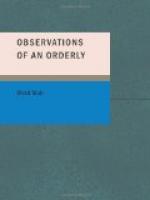I regretted when a change of plans diverted the ambulance trains to the central termini for evacuation. The interlude of a station-party trip was far from unwelcome. Lined up on the parade ground we were put in charge of a corporal. “Party, ’shun! Right turn! Quick march!” Off we trudged, round the back of the hospital, down the drive, out past the sentry and away along the road. Presently, “Party, march at ease!” Cigarettes were lit, talking was allowed, and someone would raise a tune. How pleasant it is to march to singing! To march to a drum-and-fife band must be wonderful. Or a brass band—! Those joys will never be mine. Almost all the marching I shall have done in the great war will be summed up in these tiny promenades from the hospital to the railway-station, their rhythm sustained by self-raised choruses, none too melodious.
Occasionally an officer would be descried, on the pavement. Then “Party, ’shun!” Cigarettes were concealed. The song died. “Eyes left! ... Eyes front! Party, march at ease!” The cigarettes reappeared, the song was resumed. Approaching the station, “Party, ’shun!” Cigarettes were thrown away. Here, in the chief street, we must make a smart show. A crowd is gathered round the station gate, attracted by the array of Red Cross vehicles within. Police are keeping back the curious. The way is cleared for our arrival. “Left wheel!” Now is our one moment of glory. We swing round, through the lane of gaping sightseers, and tramp-tramp in style across the station yard and under the archway, flattering ourselves (perhaps not without justification) that there are spectators whose eyes pursue us with secret envy at the serious import of our task.
The station platform, when we reached it, was generally a blank perspective devoid of all living creatures except ourselves. Fate decreed that we should be summoned long before the train was due. I have kicked my heels for many a doleful hour on that platform, and the reflection that “they also serve who only stand and wait” was chilly comfort if—as frequently happened—we had been hurried off dinnerless. The convoys’ arrivals always seemed to coincide with dinner-time. On our return to the hospital we should find that the rations had been kept hot for us. But, in the meanwhile, an empty stomach was a poor preparation for the strain of carrying stretchers up the stairs from the station platform to the ambulances; and those of us who could produce pennies for automatic-machine chocolate gained an instant popularity. The longest period of waiting drew to an end at last, however. The platform assumed a livelier air. The station-master appeared from his den. Officers of the Army Medical Service and the Red Cross strolled down. And the stairs and platform echoed to the pattering of the feet of hosts of industrious “Bluebottles,” fetching stretchers and blankets.




